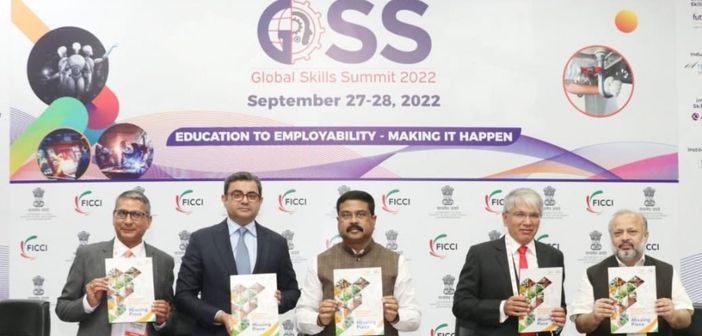FICCI (Federation of Indian Chambers of Commerce and Industry) organized the “13th Global Skills Summit – Education to Employability: Making it happen” on September 27, 2022, to strengthen connections between academia, industry, and policymakers as well as develop a coordinated strategy to advance effective transformation in the education and skills sector.
Highlights:
Govt to come up with Digital University frameworks to facilitate workforce: Dharmendra Pradhan
- A collective effort of policymakers, academia, and industry is imperative to promote skill and education
- India’s fundamentally strong, potential in captive markets along with demographic dividend
- FICCI knowledge reports ‘Reimagining Vocational Education in India’ & ‘Skill Reforms: Study of Regulations, Compliances & the Skilling Ecosystem’ released
The summit was attended by eminent guests, Mr. Dharmendra Pradhan, Minister of Skill Development & Entrepreneurship and Education; Mr. Subhrakant Panda, Senior Vice President, FICCI and MD, Indian Metals and Ferro Alloys Ltd; Mr. Manish Sabharwal, Chair, FICCI Skill Development Committee, and Vice Chairman & Co-Founder, Teamlease Services Ltd; Mr. TV Mohandas Pai, Honorary Advisor, FICCI Skills Development Committee & Chairman, Manipal Global Education; Mr. Atul Kumar Tiwari, Secretary, Ministry of Skill Development and Entrepreneurship, Govt of India; Mr. Sanjay Shivnani, Co-Chair, FICCI Skills Development Committee & Head Technical Training and Hindalco Technical University, Hindalco Industries Ltd, Aditya Birla Group.
The government of India is establishing a digital university to advance education and skill development, according to Mr. Dharmendra Pradhan, Minister of Skill Development & Entrepreneurship and Education, “NEP 2020 envisions skill and education as one. We are developing a Digital University with numerous entry and departure frameworks, as well as an academic bank of credit, to help our workers. These policy changes and adaptable frameworks must be adopted by the industry. India has a demographic dividend, which is a blessing. When it comes to transforming our demographic dividend into a revolutionary powerhouse, education and skills must be major factors.”
Mr. Dharmendra Pradhan highlighted India’s advantages for the next 25 years, claiming that no other nation in the world has such a huge captive, aspirational, and high purchasing capability. The domestic fundamentals of India are very solid, and despite COVID, the Indian economy has maintained a growth rate of 7-8% and is headed for double-digit growth.

Leveraging skills is necessary to increase employability, benefit from the demographic dividend, and create a more robust skills ecosystem. “We must increase the education and skill of our workforce if we want India to be more productive and stronger. Our workforce is now more vibrant thanks to the apprenticeship act and the simplifying of labour laws. To increase the productivity of our workforce, we are implementing more changes”, said by Mr. Dharmendra Pradhan.
In a world that is changing quickly and is more driven than ever before, Mr. Subhrakant Panda, Senior Vice President, FICCI and MD, Indian Metals and Ferro Alloys Ltd., stated that static knowledge cannot be the rule. “FICCI is eager to contribute positively to the transition from education to the workplace through PPP mode. India will become a high-income developed country as we commemorate our 100th anniversary of independence, and to make that happen, it is crucial to utilize the demographic dividend.
According to Mr. Manish Sabharwal, vice chairman and co-founder of Teamlease Services Ltd. and chair of the FICCI Skill Development Committee, “There are a few design principles for skilling that India has learned over the past few years, including learning by doing, learning by doing, learning with qualifications, and learning with multi-modal delivery”.
“It is time, to consider developing skills policies for each state independently. Within each state, we should also consider districts. Industrial policy and skills policy must be combined,” said Mr. TV Mohandas Pai, Honorary Advisor to the FICCI Skills Development Committee and Chairman of Manipal Global Education. Additionally, he urged the government to include a job incentive program in the upcoming Budget.
Speaking on the theme of “Skilling in Schooling and Schooling in Skilling,” Mr. Atul Kumar Tiwari, Secretary, Ministry of Skill Development and Entrepreneurship, Government of India, asserted, “It is inevitable that there will be significant changes in how education and skill development are provided in the nation”. He added that the PMKVY 4.0 program would expand the scope of the Skill Hub project by making use of the infrastructure provided by the government at various institutions to support both short- and long-term skilling programs. “We are re-evaluating all of the employment roles that are currently available as part of the skilling program, making employability skills a requirement for each one, and aligning them with the credit system”.
Also read: “Making India a Global Drone Hub”, two-day conference by FICCI https://nationalskillsnetwork.in/making-india-a-global-drone-hub-two-day-conference-by-ficci/
The potential of education and skilling in India was also discussed by Mr. Sanjay Shivnani, Co-Chair of the FICCI Skills Development Committee and Head of Technical Training and Hindalco Technical University, Hindalco Industries Ltd., Aditya Birla Group.














Our next generation is Global digital talents Our education, Training, and systems are not in line with industry . Teaching and syllabus are out dated what is learning and the digital age need Leadership, quality of education not Only higher marks Begining of schools to end of collage are not able to understand what a student capability and how to strengthen weakness. Engineers, are most hard working and least respected . We will not grow with out good engineers Education institutions must understand value of education